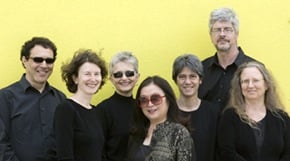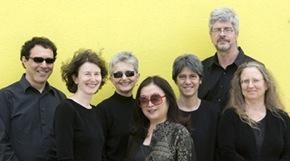
The new-music chamber ensemble Earplay boasts some impressive numbers. In 25 years of existence the group has performed more than 425 works, introduced 104 world premieres, and commissioned 45 new compositions. Many of these pieces have Bay Area roots, part of conductor Mary Chun’s stated emphasis on giving voice to local composers. And for its May 24 concert, “Ports and Portals,” held at San Francisco’s Herbst Theatre in partnership with the San Francisco International Arts Festival, the ensemble adds two more world premieres and two West Coast premieres to the tally.
Blending works diverse in inspiration, by composers on various career trajectories, the program finds unity in the idea of composers “migrating to Bay Area ports and responding to their new environment by creating works that take us to other dimensions through musical portals,” according to Executive Director Aislinn Scofield. Established names include Pulitzer Prize–winner Wayne Peterson, a longtime Earplay associate who offers his lighthearted Scherzo for Mixed Quartet. Hyo-shin Na’s Song of One Lost in the Fog bridges California Native American, East Asian, and Western cultures, while the late Jorge Liderman’s Swirling Streams promises what Scofield terms “a kinetic tour-de-force” of energy. Composers with emerging reputations include Christopher Moore, whose Amnesia Barrier is inspired by memory loss resulting from electroshock therapy, and Tolga Yayalar, represented by his Greek/Byzantine-flavored Terâneler.
Chun’s involvement with Earplay began a decade ago, when she was asked to guest conduct a concert. The chemistry was instantly apparent, and she’s been a passionate exponent ever since, relishing her Earplay engagements with a fierce intensity. “Not only do we challenge ourselves with every piece that comes before us individually as musicians, we also challenge each other to dig the deepest into a score,” Chun says. “One of the most satisfying things I find with Earplay is the ferocious commitment to perform at the highest level, with exceptional skill and artistry. Plus, we actually enjoy working together!”
As further evidence of this commitment, Chun cites violinist Terrie Baune, one of seven regular “Earplayers,” who describes the ensemble’s pact with the audience thus: “to present works we think need to be heard, with the most committed performances we can produce.” Baune gets particular satisfaction out of plumbing this music’s emotional content, a dynamic engagement between composer and performer that extends to the audience as well: “We learn from [composers] and they learn from us, [and] in turn, audiences share in the experience of growing the art.”
Given this attitude, it’s not surprising that choosing repertory for each season involves painstaking effort. A programming committee comprising Chun and Earplay musician/composer representatives determines the lineup after countless hours of reviewing submissions, received through ongoing calls for scores, as well as recommendations from fellow musicians and colleagues, agents, and publishers. The Donald Aird Competition also enables Earplay to mine for unheralded composers and unearth some diamonds from the rough. (Yayalar’s work on the May program was the 2009 Aird winner.)
For Chun, working with Earplay means addressing the very fundamentals of artistic production, from hands-on engagement with a piece to its reception by the audience and ultimate place in the canon. “I see what we do as an essential part of the process that shapes the art — that culling process that takes place over time wherein some music survives and some doesn’t. It’s an interesting challenge to introduce new works to our audience, some of whom may or may not appreciate or like what they hear.”

